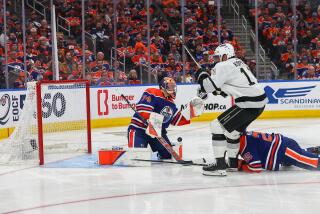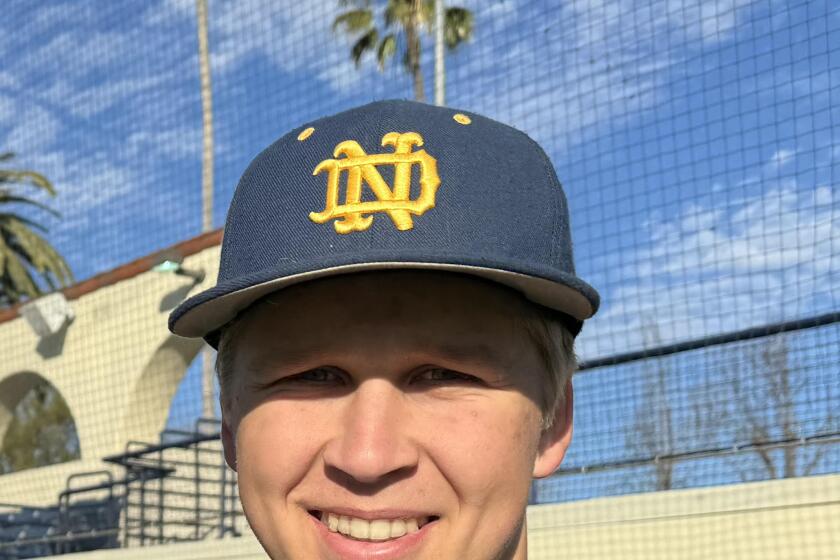Terrapins Have Empty Feeling : College basketball: The cruel reality of being banned from the ACC tournament begins sinks in for players, coach.
The ride back to the airport was somber, just as Gary Williams suspected it would be. It’s the very reason he didn’t want to come in the first place. Sure, Williams wanted Matt Roe, Cedric Lewis and Eric Kjome to take part in the Atlantic Coast Conference’s senior dinner here Thursday night. “The problem I had with them going,” Williams said Friday, “was their reaction after getting too close to the excitement, then having to leave. Frank McGuire and famous ACC people were there and I knew how much they’d want to be a part of it. I knew they’d be down.”
Down, of course, about being excluded from the ACC tournament that started Friday. Williams didn’t say so, but the players weren’t the only ones down; so was he. “Matt and Eric never got to play in an ACC tournament and that particularly bothers me,” Williams said. “I wanted them to see the importance people put on the tournament, I wanted them to hear people telling stories about the ’70 game that undefeated South Carolina lost, or the ’74 Maryland-N.C. State game.”
Williams couldn’t help but get nostalgic. As a guard at Maryland in the early- and mid-’60s, he played in the ACC tournament. “My sophomore year,” he recalled, “it was in Raleigh. We played N.C. State in the semifinals and the noise-level was incredible. We had beat Clemson that year, and it was the only tournament game we won in my three years, but it was an experience you wouldn’t trade for anything.”
Maryland officials, led by one Lefty Driesell, complained loud and often that the tournament wasn’t played frequently enough outside North Carolina. The Terps always played the role of the distant cousin, having to put up with the rest of the kinfolk for a long weekend. Driesell always kidded that if he won the thing -- and he did only once, in 1984 -- he’d bolt the championship trophy to the hood of his car and drive through the state of North Carolina blowing his horn.
What’s that line about not missing something till you don’t have it? “I hate to say this, coming from Maryland,” Williams said, “but that’s the place the thing belongs.”
As strapped financially as Maryland’s athletic department is, it would probably trade the revenue the school will still share from this tournament for the pleasure of having the team here. But that is not an option. The NCAA, when it put Maryland’s basketball program on probation almost a year ago to the day, said the team was barred from playing on live television.
Conference tournaments are made-for-TV events. “We couldn’t figure out any way to do it,” ACC Commissioner Gene Corrigan said. “We couldn’t even let them play the first game because suppose they won. We couldn’t say: ‘Ooops, how did you do that? You won that game.’ We could take one game off television, sure, like we did when they played in the Big East-ACC Challenge. But we couldn’t take the tournament semis or the final off live TV” if Maryland advanced that far.
So for the first time since North Carolina pulled itself from the 1961 ACC tournament because it was on probation (TV, to be sure, wasn’t the issue then) the ACC tournament is incomplete. When Georgia Tech and North Carolina State went for the opening tipoff Friday afternoon at 2, it was difficult to spot any group that identified itself with the University of Maryland.
Tommy Amaker, the Duke assistant coach who grew up a maniacal Terps fan in Northern Virginia, couldn’t make himself get used to the fact that Maryland isn’t here. “The whole thing’s just strange,” he said. “Seven teams instead of eight, a bye for us in the first round. The whole structure of the tournament has changed. Look around here, do you see anybody from Maryland? I can’t even imagine playing at an ACC school and not having the honor of being here. It’s too strange.”
The whole topic threw the bubbly Corrigan into a melancholy mood for a few moments Thursday. “Everybody dislikes it,” he said. “It’s the hardest part, in a lot of ways, of their sanctions. To not have somebody here is a shame.”
Terry Holland, the longtime Virginia coach who is now director of athletics here at Davidson and a TV analyst, said, “I did four games at Maryland this year, and I grew to be a Maryland fan. It strikes me that these kids are the ones being penalized. Being in the ACC and not competing in the tournament? I can’t imagine it.”
Sitting at midcourt of the new Coliseum, wearing a broadcast headset, was an honest-to-good Maryland person, Len Elmore, who played in three ACC tournaments back when (to use his words) the ACC tournament was the League Championship Series before the World Series. “You know what I wonder?” he said. “Will anybody miss them?”
Elmore has a theory. He says that Maryland’s knowing they’d be excluded from the postseason tournaments “helped them develop the intensity with which they played during the year.”
Williams, told of Elmore’s theory, didn’t disagree. Only a Terp’s mama could have expected 16 victories out of this team. Maryland played, almost without exception, with a fury every night. “I never tried to sell it to the players that way, that we should play harder because we don’t have the ACC or any other postseason tournament to look forward to,” Williams said. “But I think in the back of their minds they placed more emphasis on the regular season.”
This all could have been avoided if the NCAA’s Committee on Infractions had acted fairly. But we’ve known for a while that’s too much to hope for. Williams said he’d watch some of the tournament on television, but more of the state basketball high-school playoffs being played at Cole Field House.
The seven remaining teams undoubtedly will carry on just fine without Maryland, without Terrapins fight songs, without those ugly red, white, yellow and black flags. And it will be the kind of tournament the ACC will never want to put on again.
More to Read
Get our high school sports newsletter
Prep Rally is devoted to the SoCal high school sports experience, bringing you scores, stories and a behind-the-scenes look at what makes prep sports so popular.
You may occasionally receive promotional content from the Los Angeles Times.






